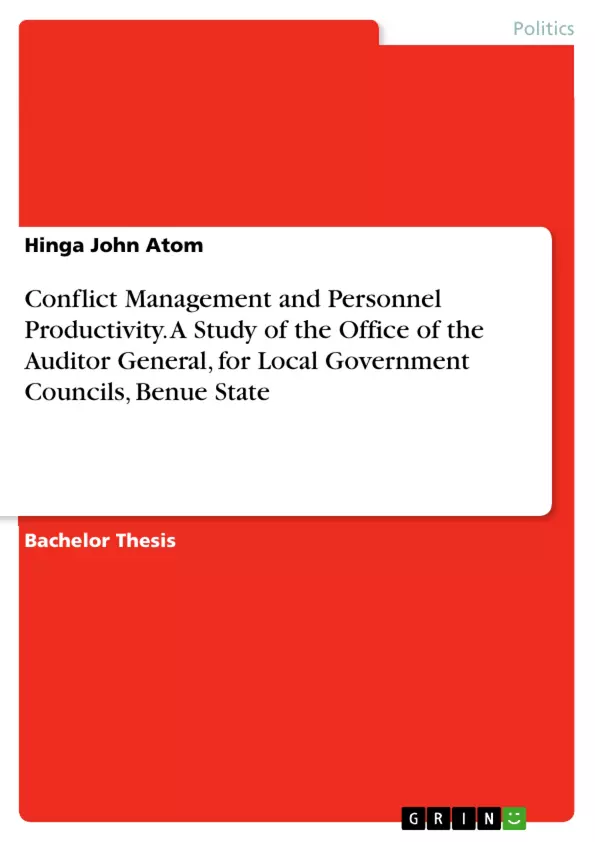The persistence of conflict in the Nigeria economy has continued to lead to the question what is particularly wrong. Whereas morale does not just occur but achieved by management through careful planning, creating a feeling of oneness between employees and management as a basic objective. Grievances, experience are partly cured and repression double endured.
This research is an attempt to ascertain the viability of conflict management and personnel productivity; A case study of the Office of the Auditor General for Local Government Councils, Benue State.
It is restricted on how effectively conflict could be managed having in mind the effects it has on personnel productivity in order to avoid any red tape that could lead to the hindrance of objectives and goals set by an organization. So also to seek the question:
- Are the working condition of personnel and process of collective bargaining effectively enhanced?
- To what extent has Departmental Head tried to alienate personnel conflict within their departments?
- Does lack of good relation with personnel and departmental Heads affect the productivity of personnel?
The above questions and many more, data collected shall be analyzed carefully in tabular form, interpreted based on the questionnaire showing the reaction of personnel staff were possible showing whether management does take workers demand seriously or until they decide on industrial action and possible recommendations on how best to manage employer, employee relations so as to avert if not possible minimize conflict.
Thus data collected shall be analyzed carefully in tabular form, interpreted based on the questionnaire showing the reaction of employees reaction in the work environment where improvement would be solicited for effective productivity. Were possible showing the absence of conflict does not mean there is peace and harmony within the organization.
Employees view as to whether management does take workers demand seriously or until they decide on industrial action and possible recommendations on how best to manage employer, employee relations so as to avert if not possible minimize conflict.
Inhaltsverzeichnis (Table of Contents)
- CHAPTER ONE: INTRODUCTION
- 1.1 Background to the Study
- 1.2 Statement of the Problem
- 1.3 Objectives of the Study
- 1.4 Research Questions
- 1.5 Scope and Delimitation of the Study
- 1.6 Significance of the Study
- 1.7 Definition of Terms
- CHAPTER TWO: LITERATURE REVIEW
- 2.1 Concept of Conflict Management
- 2.2 Concept of Personnel Productivity
- 2.3 Theoretical Framework
- 2.4 Empirical Review
- CHAPTER THREE: RESEARCH METHODOLOGY
- 3.1 Research Design
- 3.2 Population of the Study
- 3.3 Sample and Sampling Technique
- 3.4 Research Instrument
- 3.5 Data Collection Procedures
- 3.6 Data Analysis Technique
- CHAPTER FOUR: DATA PRESENTATION, ANALYSIS AND INTERPRETATION
- 4.1 Data Presentation and Analysis
- 4.2 Interpretation of Data
- CHAPTER FIVE: SUMMARY, CONCLUSION AND RECOMMENDATIONS
- 5.1 Summary of Findings
- 5.2 Conclusion
- 5.3 Recommendations
- 5.4 Limitation of the Study
- 5.5 Suggestions for Further Studies
Zielsetzung und Themenschwerpunkte (Objectives and Key Themes)
The primary aim of this research is to evaluate the effectiveness of conflict management in relation to personnel productivity at the Office of the Auditor General for Local Government Councils, Benue State. This study seeks to understand how conflict management practices influence the efficiency of personnel within the organization.
- The impact of conflict management on personnel productivity.
- The effectiveness of existing conflict management strategies within the organization.
- The role of management and departmental heads in addressing conflict and promoting a productive work environment.
- The relationship between personnel satisfaction, workplace relations, and overall productivity.
- The potential for improving conflict management practices and achieving greater personnel productivity.
Zusammenfassung der Kapitel (Chapter Summaries)
Chapter 1: Introduction presents the background of the study, outlining the context of conflict and productivity within the Nigerian economy. It defines the research problem, objectives, and research questions, establishing the scope and significance of the study. Key terms related to conflict management and personnel productivity are also defined.
Chapter 2: Literature Review explores relevant theoretical frameworks and empirical research related to conflict management and personnel productivity. The chapter delves into concepts such as the nature of conflict, effective conflict resolution strategies, and the impact of workplace dynamics on productivity.
Chapter 3: Research Methodology details the research design employed, including the population and sampling technique used to gather data. The chapter outlines the research instruments, data collection procedures, and data analysis techniques utilized in the study.
Chapter 4: Data Presentation, Analysis and Interpretation presents the collected data, analyzes it using appropriate statistical methods, and interprets the findings. This chapter provides a detailed examination of the relationship between conflict management and personnel productivity within the Office of the Auditor General.
Schlüsselwörter (Keywords)
Conflict management, personnel productivity, workplace relations, employee satisfaction, organizational effectiveness, public sector, Nigeria, Benue State, Office of the Auditor General.
Frequently Asked Questions
What is the relationship between conflict management and productivity?
Effective conflict management prevents departmental "red tape" and morale issues, thereby enhancing the overall productivity of personnel within an organization.
Which organization was studied in this research?
The study focuses on the Office of the Auditor General for Local Government Councils in Benue State, Nigeria.
How do departmental heads influence workplace conflict?
Departmental heads play a crucial role in alienating or resolving personnel conflicts, which directly impacts the efficiency of their respective departments.
Does an absence of conflict mean there is harmony?
No, the research suggests that the mere absence of visible conflict does not necessarily guarantee true peace and harmony within a work environment.
What methods were used to collect data for this study?
The study utilized a descriptive research design, employing questionnaires to gather views from personnel regarding management and working conditions.
- Quote paper
- Hinga John Atom (Author), 2020, Conflict Management and Personnel Productivity. A Study of the Office of the Auditor General, for Local Government Councils, Benue State, Munich, GRIN Verlag, https://www.grin.com/document/1141772



